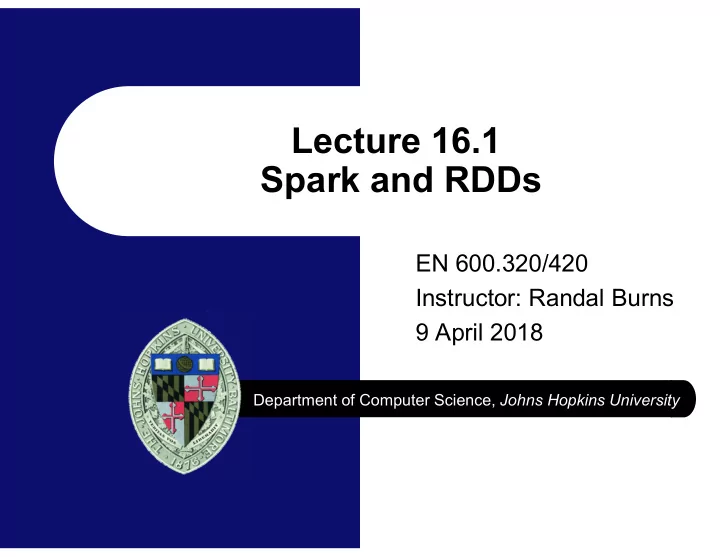

Lecture 16.1 Spark and RDDs EN 600.320/420 Instructor: Randal Burns 9 April 2018 Department of Computer Science, Johns Hopkins University
Spark: Batch Computing Reload Map/Reduce style programming – Data-parallel, batch, restrictive model, functional – Abstractions to leverage distributed memory New interfaces to in-memory computations – Fault-tolerant – Lazy materialization (pipelined evaluation) Good support for iterative computations on in-memory data sets leads to good performance – 20x over Map/Reduce – No writing data to file system, loading data from file system Lecture derived from: Zaharia et al. Resilient distributed datasets: a fault-tolerant abstraction for in-memory cluster computing . USENIX NSDI, 2012: Lecture 16: Spark and RDDs
RDD: Resilient Distributed Dataset Read-only partitioned collection of records Created from: – Data in stable storage – Transformations on other RDDs Unit of parallelism in a data decomposition: – Automatic parallelization of transformation, such as map, reduce, filter, etc. RDDs are not data: – Not materialized. They are an abstraction. – Defined by lineage. Set of transformations on a original data set. Lecture 16: Spark and RDDs
RDD Lineage Lines backed by HDFS Errors – filtered lines Time—collected makes real data Lecture 16: Spark and RDDs
Logistical Regression: A First Example: Features: – Scala closures (on w), functions with free variables – points is a read-only RDD for each iteration – Only w (a scalar) gets updated Lecture 16: Spark and RDDs
Managing the State of Data persist(): indicates desire to reuse an RDD, encourages Spark to keep it in memory RDD(): the representation of a logical data set sequence: a physical, materialized data set In Spark-land, RDDs and sequences are differentiated by the concepts of – Transformations: RDD->RDD – Actions: RDD->sequence/data RDDs define a pipeline of computations from data set (HDFS) to sequence/data – RDDs evaluated lazily as needed to build a sequence Lecture 16: Spark and RDDs
Transformations and Actions Parallelized constructs in Spark – Transformations are lazy whereas actions launch computation Lecture 16: Spark and RDDs
Recommend
More recommend